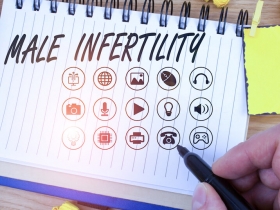Overview of Male Infertility - Causes, Diagnosis, and Common Treatments
Researchers estimate that 8–12% of couples globally are affected by infertility. And male infertility is identified as a primary or contributing cause in approximately 50% of them [1].
With the term male infertility, we define the inability of a man to impregnate a woman after a year of regular and unprotected intercourse. It can be due to various factors, including genetic, hormonal, anatomical, or lifestyle-related issues. This article offers you a short overview of the causes, diagnosis, and treatment options for male infertility:
Causes of Male Infertility
- Abnormal sperm production or function
The issues with the production of sperm, its quality, or mobility can affect fertility. The reasons could be genetic defects, hormonal imbalances, testicular infections, as well as exposure to some medications, toxins, or radiation.
- Varicocele
A varicocele is the condition of enlargement of veins within the scrotum. It can lead to reduced sperm quality or production.
- Blockages in the reproductive system
Obstructions in the tubes through which sperm travels (vas deferens) or the ejaculatory ducts can prevent the sperm from being ejaculated. These can be due to recurrent infections, surgery (such as vasectomy), swelling, or developmental defects.
- Problems with ejaculations
Problems with ejaculation, such as retrograde ejaculation (semen entering the bladder instead of exiting the penis) or premature ejaculation, can prevent sperm from reaching the uterus.
- Hormonal imbalances
Disturbances in testosterone, follicle-stimulating hormone (FSH), or luteinizing hormone (LH) can affect the production of sperm and, thus, fertility.
- Genetic disorders
Some hereditary conditions, such as Klinefelter syndrome or Y-chromosome microdeletions, can cause infertility in men.
- Lifestyle factors
Excessive alcohol consumption, heavy smoking, drug abuse, obesity, exposure to environmental toxins, high levels of stress, and overheating the testicles (from saunas, hot tubs, or tight clothing) can harm sperm production and its quality.

Diagnosis of Male Infertility
A detailed evaluation of male infertility may involve one or more of the following diagnostic tests:
- Analysis of the semen can evaluate the quantity, quality, and motility of sperm in the semen sample.
- Hormone testing done through blood work can assess testosterone, FSH, LH, and prolactin levels to determine hormonal imbalances.
- Genetic screening can identify any chromosomal abnormalities or genetic disorders to identify or exclude them as factors causing infertility.
- Imaging techniques such as ultrasound can help identify structural abnormalities, blockages, or varicoceles.
- Post-ejaculation urinalysis examines the urine for the presence of sperm after ejaculation to determine if there is retrograde ejaculation.
Male Infertility Treatment
The possible treatments for male infertility are related to the causes determined by the diagnostic evaluation. Some common treatment approaches can include the following:
- Medications
Medications can help balance the hormones and treat infections or inflammation, which might affect fertility.
- Surgery
Today specific surgical procedures can remove blockages, varicoceles, or other anatomical abnormalities.
- Assisted reproductive techniques
In cases of severe male infertility, assisted reproductive techniques like in vitro fertilization (IVF), intracytoplasmic sperm injection (ICSI), or sperm retrieval methods (such as testicular sperm extraction) can be used.
- Lifestyle modifications
Making healthy lifestyle choices by quitting smoking, reducing alcohol consumption, managing stress, maintaining a healthy weight, and avoiding exposure to toxins can lead to improved fertility in men.
Couples struggling to conceive should reach out to a fertility specialist or reproductive endocrinologist, These specialists can provide personalized guidance and recommend the most appropriate treatment options based on the individual situation.
Sources:
- Agarwal, A., Baskaran, S., Parekh, N., Cho, C., Henkel, R., Vij, S. C., Arafa, M., Selvam, M. K. P., & Shah, R. (2021). Male infertility. The Lancet, 397(10271), 319–333. https://doi.org/10.1016/s0140-6736(20)32667-2
- Male Infertility: Symptoms, Diagnosis & Treatment - Urology Care Foundation. (n.d.). https://www.urologyhealth.org/urology-a-z/m/male-infertility#Treatment






